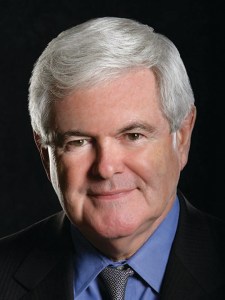Exclusive Author Q&A Newt Gingrich
- What advice would you give to aspiring writers?
There is a story (it may be apocryphal) that says Ernest Hemingway was once paid $1,000 to write a thousand words on how to become a writer. He apparently wrote “the key to learning to be a writer is to write…” then repeated the word “write” 989 times. I can’t improve on Hemingway. Write and let others critique it. Then write some more.
- What do you like about writing? What do you not like?
I love the challenge of trying to get an idea, image, or story out of my head and onto paper, so others can share it. I try to never forget that the key to written or spoken communications is always in the reader or listener – not the writer. Real communication is about what they perceive – not just what I want to say. In writing Trump’s America, I have constantly tried to communicate with the American people, so they could understand what I see happening in our country.
- What were your favorite books growing up / which books influenced your writing?
I read a bit of everything. I liked Edgar Rice Burroughs’s Tarzan and Barsoom series (the Barsoom novels, which were about the character John Carter going to Mars, impressed me more). I also read American histories and many animal books. Frank Buck’s Bring ‘Em Back Alive was a big winner for me.
- Who are writers you like?

I read everything Daniel Silva writes. I am constantly looking for novelists who are strong storytellers. I like the rhythm of good writing and clear description. John Sandford is another example.
- Do you have a designated writing space? What is your writing process?
I write on my iPad wherever I am. For example, I am writing these answers in a hotel room in Tuscany, looking out at vineyards and a rolling countryside. I write on planes, in cars, at home, sometimes even in the office (although the office is usually for meetings). Much of Trump’s America was written and rewritten on airplanes.
- How do you come up with ideas for projects?
I am constantly learning. The world is so huge and constantly changing. I try to understand what has happened (throughout history and natural history), what is happening, and how to make sense of them. Trump’s America was a natural follow on to Understanding Trump, and in it, I attempted to capture the world President Trump is trying to create more than a year after his inauguration.
- What are you working on now?
I am really enjoying producing a Facebook series called “What If? History That Could Have Been.” We have more than 57,000 subscribers. I am also thinking about writing a fourth novel with Pete Earley. In addition, I am beginning to work on a book about space and the great opportunities America has in the very new future. I like to stay busy.
- What interested you about writing about the Trump presidency?
The Trump presidency is one of the most tumultuous and consequential in modern times. Members of the Left and the establishment (which are almost the same thing but not entirely) hate the President so much they can’t think rationally about what is happening. President Trump and his team are doing so many good things that have broad support from millions of Americans – yet the elite media continues its unending barrage of attacks. It’s really remarkable – the difference between the reality of the Trump presidency and the false reality that the elites are trying to create. This is an important moment in American history and a situation worth exploring and attempting to explain. This was the origin of Understanding Trump, and it is a central theme of Trump’s America.